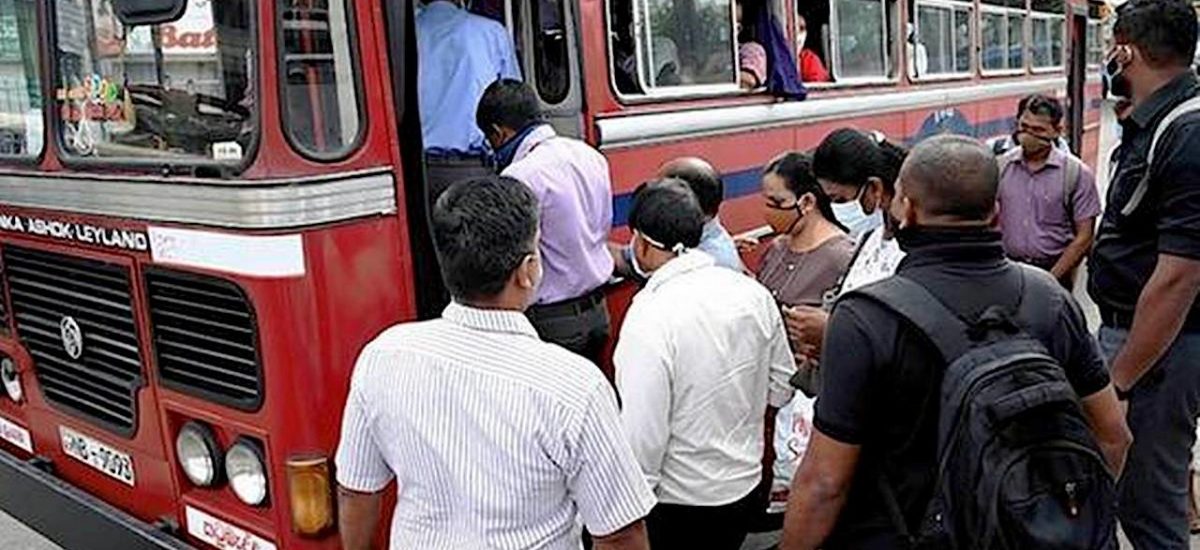Photo courtesy of The Hindu
Before the current lockdown, the Sri Lankan government asked its employees to come back to work in early August but the escalation of the pandemic and a new lockdown put a halt to its plans.
Now many, especially political and business leaders, are keen to go back to business as usual; the rhetoric of a new normal, often uttered at the onset of the pandemic, seems long forgotten. Yes, the lockdown and lack of economic activity hurt people, businesses and the nation. But is the solution going back to the same old ways?
Whenever Covid-19 numbers drop, there’s a rush to re-start the economy. Each dip in cases has coincided with heavy traffic, people commuting for hours crammed into buses and trains and crowded public spaces. Even during the lockdown, large numbers of vehicles are on the streets.
The congestion was perhaps most visible in Colombo and on routes where commuters travel daily to the capital. According to available government reports, the city’s population increases 200% during the day on weekdays due to traveling office workers. During rush hours by the beachside train tracks we saw packed coaches with people clinging onto the doors.
Would the scenes be any different if all workers are back to work post lockdown?
More importantly, even if everyone’s vaccinated, will this not put many people at risk? The evidence emerging from around the world is that even with high vaccination rates, many breakthrough cases happen due to mutations, people with compromised immune systems and vaccines with varying levels of efficacy. It is also clear that no vaccine is 100% effective at preventing transmission.
Many government, business and NGOs asked reluctant workers to report despite risks until the lockdown. Some came to work in offices at companies, government and NGOs despite having little to do, with many people staying away from non-essential activity due to pandemic worries. In some cases, there’s evidence of clusters emerging at work and public places due to gatherings that added no value to the businesses or people.
In today’s connected world, technology and innovation allow many things to be done remotely and online without unnecessary risks. Even in Sri Lanka and within the government sector, there are positive examples. During the lockdown I was surprised at how responsive the telecom regulatory and consumer protection authorities were online. Unfortunately, this is far from the norm since I have experienced complete service failure at a major mobile company, private bank and a couple of government institutions.
Adopting technology allows for economic activity and public services to continue. It also offers other benefits such as savings in fuel, administration and maintenance costs of offices, roads and other physical facilities, and time.
Let’s stop and think beyond the pandemic. Is the best way to progress built on overcrowded cities, uncomfortable commuting, unsustainable spending of money and environmentally harmful energy sources?
Even government experts from two previous regimes didn’t think so, according to Sri Lanka’s report to the Third United Nations Conference on Human Settlements (Habitat III). The report is bipartisan as the work started in 2014 under the SLFP government and it was finalised under the UNP. Over 50 experts in housing, urban development, planning, finance and more participated in producing it.
Although the administration submitting the report changed some narratives to fit their propaganda, the underlying desire to find sustainable and people-friendly solutions to challenges remained.
The report spoke of moving beyond orthodox models. It suggested that routine travel could be cut by 75% if working from home, better use of information technology and teleconferencing were mainstreamed. Over the medium to long term, it proposed redistributing offices to where people live rather than commuting long distances.
Even if we cut routine travel by a fraction of the 75% suggested, as a nation we will spend less on vehicles, roads and environmentally harmful fossil fuels, translating into substantial economic savings. This can reduce our reliance on debt-multiplying imports.
As people, we will spend less money and time commuting and breathe cleaner air. The time saved will allow us to be more productive, gain new skills, enjoy leisure and strengthen relationships. While everyone will benefit, there’s more to be gained for those challenged by different abilities, looking after young children, facing mobility challenges and performing multiple family and social care roles.
If the travel congestion reduces, those who must travel for work such as healthcare workers, vendors and manufacturers will be able to do so safely and quickly. In addition, their burdens in office and in-person service queues will reduce, resulting in even more savings of time, money and physical spaces.
These reasons may be why the world wants a new normal. Two-thirds of 12,500 people in 29 countries surveyed by the World Economic Forum wanted flexible work arrangements rather than going back to work daily. Almost a third said that they would look elsewhere if employers demanded it.
But change isn’t easy to implement. Challenges include our habits, mutual distrust between workers and authorities, lack of investment in technology, and those who will benefit from the existing ways. These short term and limited benefits to a few come at longer term sustainable benefits to all and the nation.
The government has repeatedly spoken of adopting new thinking and technology to promote sustainable and inclusive growth. However, its ability to change, adapt and act swiftly has failed so far.
The leaders must demonstrate their will and ability by making tough decisions and investing in new technologies and ways of working rather than repeating past mistakes. For instance, they must prioritise tech infrastructure and building skills over building traditional infrastructure that won’t pay dividends. They must prioritise the long term wellbeing of many over the short term gain of a few.
The country’s experts produced the Habitat III report calling for sustainable solutions in 2014/15. But seven years later, it’s disappointing that little has changed.
Perhaps there was no impetus to drive change back then. But today there is, to save lives during the pandemic, kick start economic recovery and achieve sustainable national progress and wellbeing.
Nipuna Kumbalathara is a development and communications expert


